George Cross and Medal holders, who have performed acts of the greatest heroism or displayed the most conspicuous courage in circumstances of extreme danger, gathered today to mark the 75th anniversary of the medals.
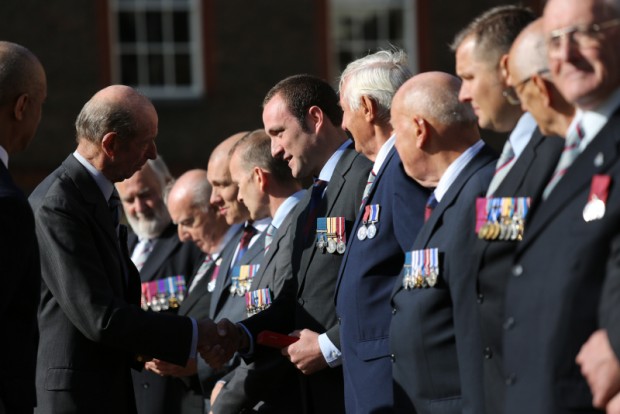
The Duke of Kent presented the medal holders with a boxed set of two coins: a new one bearing an image of the Queen, the other of her father King George VI. All have been individually engraved for each of the GC and GM holders.
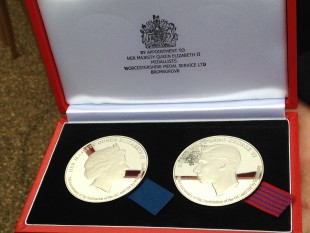
Minister of State in the House of Lords, Earl Howe, said:
It is an honour to commemorate the valiant acts performed by George Cross and Medal holders.
It is right that today we remember those people who took actions of supreme gallantry in the face of danger, often at great risk to their own lives. They represent the best of Britain by selflessly defending our people, both at home and abroad.
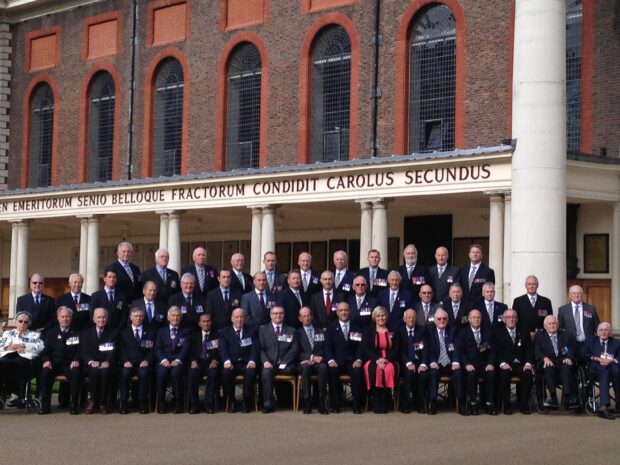
Members of the Armed Forces can receive the GC for acts of gallantry not in the presence of the enemy, for example, military explosive ordnance disposal personnel. Civilians also receive the GC.
Winston Churchill introduced the medal in 1940, as Britain came under intense air attack. Although awards to recognise civilian gallantry not in presence of the enemy already existed, none held the prestige of the equivalent award for gallantry in battle, the Victoria Cross.
Lieutenant Colonel Mark Davis GM, 53, an Ammunition Technical Officer, was awarded his George Medal in 2003 after he neutralised numerous explosive devices in Northern Ireland where the risk to his own life was extremely high.
Lt Col Davis, of 29 Explosive Ordnance Disposal Search Group in Aldershot, said: "It is particularly poignant to be here today as this year is also the 75th anniversary of the formation of Bomb Disposal and it was to recognise the bravery of our forebears and the civilians who worked alongside them in the devastation of the Blitz that this award was first created."
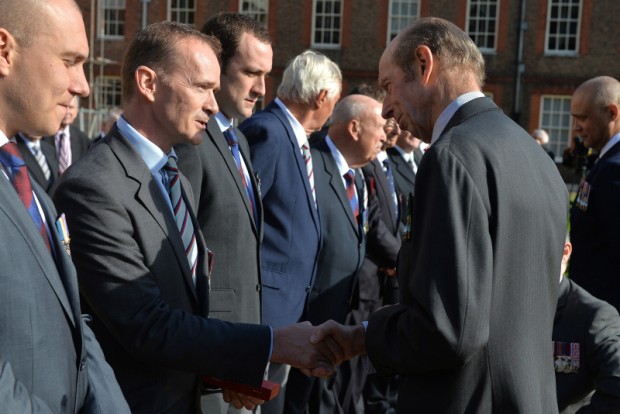
You can read more about the George Cross and Medal here.
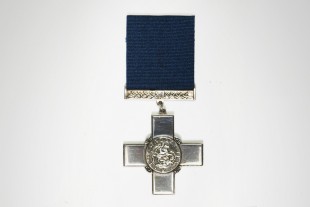
Below are the extraordinary stories of three recipients of the GC and GM.
LANCE CORPORAL MATT CROUCHER, GC
The Royal Marine Reservist dived onto a live grenade to save his comrades in Afghanistan.
On 9 February 2008, he was serving with the Commando Reconnaissance Force, tasked to conduct reconnaissance of a compound where it was suspected that Taliban fighters made improvised explosive devices (IEDs).
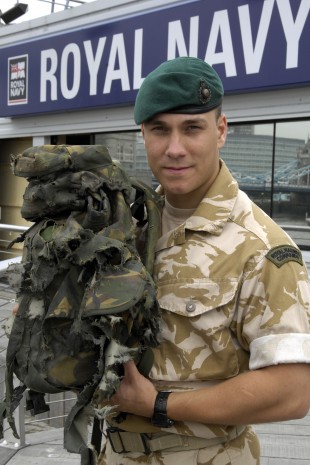
L/Cpl Croucher was at the head of the group as they began extraction. As the team moved silently through the dark compound, L/Cpl Croucher felt a wire go tight against his legs. This was a trip-wire connected to a grenade booby-trap, positioned to kill or maim intruders in the compound. He heard the grenade’s lever eject and it fell, now armed, onto the ground immediately beside him.
L/Cpl Croucher made a rapid assessment of the situation: he shouted “Grenade”, then “Tripwire” to warn his comrades to find cover before the grenade exploded.
He had no way of knowing how long the device’s fuse would take to function as low light levels prevented him from determining the type of grenade. L/Cpl Croucher decided not to seek protection for him, but attempted to shield the other exposed members of his team from the impending explosion as time was running out.
He threw himself on top of the grenade, pinning it between his day sack, containing his essential team stores, and the ground. L/Cpl Croucher lay on the grenade and braced himself for the explosion. He prepared to make the ultimate sacrifice for his fellow marines and completely disregarded his own safety,
As it detonated, L/Cpl Croucher absorbed the blast effect of the grenade and the majority of the fragmentation was contained under his body. His equipment and protective clothing prevented lethal shards hitting his body and he suffered only minor injury and disorientation from the effects of the blast. But L/Cpl Croucher’s day sack was ripped from his back and completely destroyed; his body armour and helmet were pitted by grenade fragments.
The only other injury to his team was a slight wound to the Team Commander’s face. The others escaped unscathed.
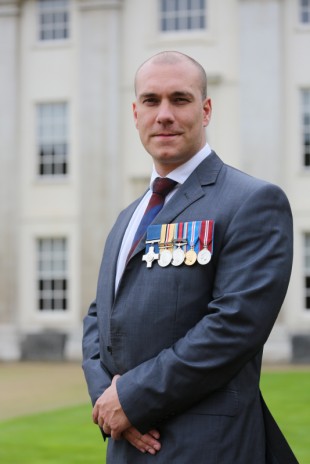
L/Cpl Croucher, from Birmingham, was the first reservist to receive either a George Cross or Victoria Cross since recent operations in Iraq and Afghanistan began.
He was deployed to Afghanistan, attached to Taunton-based 40 Commando Royal Marines in the autumn 2007. Five months later he faced down death by diving on a trip wired grenade to save the lives of his men.
He showed extraordinary bravery, self-sacrifice and devotion to duty by acting to save his comrades with the knowledge that he was unlikely to survive.
PAUL JACOBS, GM
The morning of 20 Aug 2009 was the same as every other had been for Rifleman Jacobs over his previous four months in the Upper Sangin Valley, Helmand Province: he was on patrol with his Vallon mine detector leading the way along one of the most heavily IED’d stretches of road in the whole of Afghanistan.
A member of Rifleman Jacobs’ Company was clearing an alleyway to allow a Sappers’ tractor to turn, when there was an enormous explosion that fatally wounded the soldier.
The casualty was lying on top of another IED that had been partially unearthed by the first explosion. Under risk of insurgent attack, the plan was to recover the fatality from the alleyway.
Jacobs volunteered knowing that a second device was just beside his comrade’s body. Jacobs, alone bar a single cover man, immediately set about clearing the area up to and around the body. As he did so, he confirmed that the secondary device, lying on the surface, was not touching. As he moved back up the alleyway towards his cover man, another device suddenly exploded, killing his comrade.
Jacobs was seriously wounded by the blast, with severe fragmentation damage to his eyes and bleeding heavily from multiple wounds. But he had the presence of mind and experience to drag him back onto the safe route he had just cleared and into a position where his extraction would be safer for others.
Jacobs had, with a singular sense of purpose, placed himself in the most dangerous of positions in order to recover the body of a comrade killed in action, fully aware that the smallest of mistakes would be fatal. His sheer personal courage and startling determination, unswerving courage, selflessness, devotion to duty and dedication to his comrades was faultless.
Rifleman Jacobs, aged 26, left the Army in 2013.
CHRIS FINNEY GC
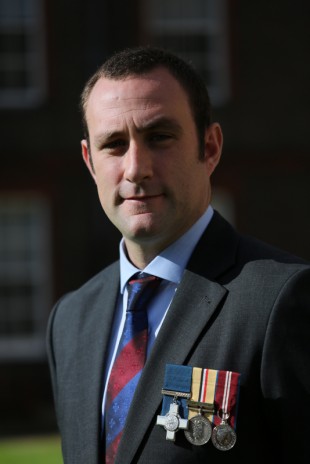
Chris, then 18 and serving in the Household Cavalry, saved the life of a colleague in a friendly fire incident in Iraq, on 28 March 2003.
Trooper Finney was part of D Squadron Household Cavalry Regiment who was probing forward along a waterway north of Basra some thirty kilometres ahead of the main force of 16 Air Assault Brigade.
Their mission was to find and disrupt the numerically vastly superior, and better equipped, Iraqi Armoured Division in the exposed desert.
Trooper Finney, a young armoured vehicle driver with less than a year's service, was driving the leading Scimitar vehicle of his troop, which had been at the forefront of action against the enemy for several hours.
In the early afternoon, the two leading vehicles paused beside a levee to allow the troop leader to assess the situation in front. Both vehicles were hit and caught fire and ammunition began exploding inside the turrets when they were suddenly engaged by a pair of Coalition Forces ground attack aircraft.
Finney managed to get out of his driving position and was trying to get cover when he noticed that his vehicle's gunner was trapped in the turret. He climbed on to the fiercely burning vehicle, placing himself at risk from enemy fire, as well as fire from the aircraft, should they have returned.
Despite the flames, exploding ammunition and smoke, Finney managed to haul out the injured gunner, get him off the vehicle, and move him to a safer position nearby, where he bandaged his wounds.
The troop officer in the other Scimitar was wounded and there were no senior ranks to take control. Finney realised the need to inform his headquarters of the situation despite his relative inexperience, the shock of the attack and the stark risk to him. He broke cover, returned to his burning vehicle and calmly sent a lucid situation report by radio.
He began helping the injured gunner towards a Spartan vehicle of the Royal Engineers which had moved to assist. He continued to help the injured gunner comrade towards safety despite the impending danger of a second attack from the aircraft. Both fired their cannon and Finney was wounded in the lower back and legs and his comrade in the head.
After getting the injured gunner to the waiting Spartan vehicle he saw that the driver of the second Scimitar was still in his burning vehicle.
Finney attempted to rescue him as well, despite his wounds and the continuing danger from exploding ammunition. He valiantly attempted to climb up onto the second vehicle but was beaten back by the combination of heat, smoke and exploding ammunition. He collapsed, exhausted, a short distance away and was recovered by the crew of the Royal Engineers Spartan.
During these attacks and their horrifying aftermath, Finney displayed clear-headed courage and devotion to his comrades, out of all proportion to his age and experience. He acted with complete disregard for his own safety even when wounded.
Mr Finney, aged 30, from Devon now runs a garden centre.
